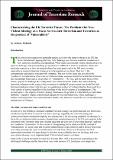Files in this item
Characterising the UK terrorist threat: the problem with non-violent ideology as a focus for counter-terrorism and terrorism as the product of ‘vulnerability’
Item metadata
| dc.contributor.author | Richards, Anthony | |
| dc.date.accessioned | 2013-08-27T12:31:36Z | |
| dc.date.available | 2013-08-27T12:31:36Z | |
| dc.date.issued | 2012-07-10 | |
| dc.identifier.citation | Richards, A. (2012). Characterising the UK terrorist threat: the problem with non-violent ideology as a focus for counter-terrorism and terrorism as the product of ‘vulnerability’. Journal of Terrorism Research, 3(1), pp. 17-26. | en_US |
| dc.identifier.issn | 2049-7040 | en_US |
| dc.identifier.uri | http://ojs.st-andrews.ac.uk/index.php/jtr/article/view/414 | en_US |
| dc.identifier.uri | https://hdl.handle.net/10023/4002 | |
| dc.description.abstract | This article investigates two particular aspects as to how the terrorist threat in the UK has been characterised, arguing that they both challenge conventional academic wisdom as to how terrorism should be conceptualised. While such conventional wisdom should always be open to challenge, and policymaking perspectives are different to those of academics, these two particular aspects as to how the terrorist threat has been perceived in the UK merit scrutiny, especially as counter-terrorism strategies have been premised on them. They are: i) the contemporary and explicit concern with ‘extremist’ but non-violent ideas that are said to be ‘conducive’ to terrorism as a focus for a counter-terrorism response and ii) the notion that terrorism has increasingly been seen as the product of ‘vulnerability’. The first, and the main focus of this article, appears to challenge the widely held view within terrorism studies that, when defining terrorism, reference to the cause or the perpetrator is unhelpful because terrorism should first and foremost (and more objectively) be seen as a particular method of violence that has been used by a wide variety of actors, regardless of the ideology or the belief systems of its perpetrators. The second aspect – the impetus towards viewing terrorism as the product of vulnerability or individual fallibility - arguably implies a diminished capacity for rational behaviour, which challenges a further commonly held view within terrorism studies: that terrorism entails the use of calculated and rational acts of violence. | en_US |
| dc.language.iso | en | en_US |
| dc.publisher | Centre for the Study of Terrorism and Political Violence, University of St Andrews | en_US |
| dc.relation.ispartof | Journal of Terrorism Research | en_US |
| dc.rights | This is an open access article published in Journal of Terrorism Research. This work is licensed under a Creative Commons Attribution 3.0 License (http://creativecommons.org/licenses/by/3.0/) | en_US |
| dc.rights.uri | http://creativecommons.org/licenses/by/3.0/ | |
| dc.subject.lcc | HV6431 | en_US |
| dc.subject.lcsh | Terrorism | en_US |
| dc.title | Characterising the UK terrorist threat: the problem with non-violent ideology as a focus for counter-terrorism and terrorism as the product of ‘vulnerability’ | en_US |
| dc.type | Journal article | en_US |
| dc.description.version | https://doi.org/Publisher PDF | en_US |
| dc.publicationstatus | Published | en_US |
| dc.status | Peer reviewed | en_US |
| dc.identifier.doi | https://doi.org/http://doi.org/10.15664/jtr.414 | en |
This item appears in the following Collection(s)
Except where otherwise noted within the work, this item's licence for re-use is described as This is an open access article published in Journal of Terrorism Research. This work is licensed under a Creative Commons Attribution 3.0 License (http://creativecommons.org/licenses/by/3.0/)
Items in the St Andrews Research Repository are protected by copyright, with all rights reserved, unless otherwise indicated.


